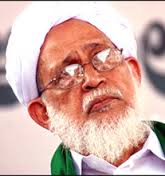Mangaluru, Apr 20: The Central Bureau of Investigation (CBI) is all set to commence its reinvestigation into the mysterious death of former Mangaluru Khazi CM Abdulla Moulavi in 2010, after a court in Eranakulam on the other day ordered for a probe into the incident.
 The Eranakulam Chief Judicial Magistrate Court order on Friday last came while disposing of a petition by CA Mohammed Shafi, son of the late spiritual leader.
The Eranakulam Chief Judicial Magistrate Court order on Friday last came while disposing of a petition by CA Mohammed Shafi, son of the late spiritual leader.
The court, while pronouncing its ruling, termed as “premature” the CBI's earlier finding that Abdulla Moulavi had committed suicide, while he was presumably on a morning stroll on the beach.
The dead body of CM Abdulla Moulavi was found in the sea near a big rock in Chembirikka in Kasargod early morning on February 15, 2010. His sandals and walking stick were found kept on the rock. The local police investigated the case for 16 days and reached the conclusion that he had committed suicide.
Couplet treated as suicide note'!
Several factors led the local police to reach to the conclusion – a note about death was found from the Khazi's diary, he had bought a new lock for his room and had visited his father's burial place climbing 30 steps the day before death. In fact the note found in his diary was reportedly the Malayalam translation of a few lines about death from the book Burda Baith'. The Crime Branch too said the same after doing a dummy test also in the same place where the dead body was found. The case was then handed over to the CBI.
The CBI also said that the Khazi was mentally and physically weak due to his health problems such as cancer for the liver etc. Treatments undertaken in several places such as Vellore were in vain and he even began meeting some people hoping to get relief. At last he resorted to suicide, says the CBI report.
However, those who counter the reports say that the aged Khazi who always has to use walking stick cannot climb on the top of the rock to jump to the sea. They say that a scholar like him did not have any necessity or situations to commit suicide. They also say that the local police was trying to write off the mysterious death as suicide to protect certain people's interests.
The Moulavi was a famous scholar and vice-president of the Samastha Kerala Jamiyathul Ulema (EK faction). The organisation had protested against the different media reports that came suggesting that the Khazi had committed suicide.




Comments
Police were in a hurry to close the case might be under pressure. Let CBP conduct fair enquiry and let the world come to know the fact. Suicide is nearly unimaginable. the Scholar will no way that he came to that decision.
Add new comment